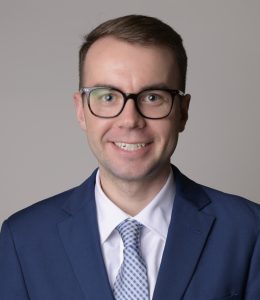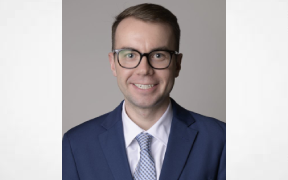Adam Kuegler ’20 got a a close-up look at federal court administration while engaged in research and writing as a Supreme Court fellow.
dam Kuegler ’20 was already practicing law when he got an opportunity to be a judicial clerk, which led him to the Supreme Court Fellows Program.
 He was one of four fellows accepted to the prestigious program for the 2023-24 year and the first ever from UConn Law.
He was one of four fellows accepted to the prestigious program for the 2023-24 year and the first ever from UConn Law.
“The fellowship gives you a better understanding of judicial administration,” Kuegler said. “Taking a year to think about the law academically, to develop my research and writing skills, and to learn from people who are great researchers, great writers, and great mentors are all things that I’ll value from this experience.”
Kuegler didn’t follow the path of starting a clerkship right after law school. Instead, he joined a law firm as an associate and then applied for clerkships, landing two with a year’s gap between them. Looking to fill that gap and seeking an opportunity to think about the law in an academic way, he came across the Supreme Court Fellows Program.
The program offers its fellows a chance to broaden their understanding of the judicial system through exposure to federal court administration. It also requires fellows to produce a “publishable-quality” work of scholarship.
“You have an opportunity to do more empirical research as opposed to solely case law research,” Kuegler said. “It provides you with that experience and with the opportunity to review the scholarly work of others.”
The fellows don’t work directly with individual justices of the U.S. Supreme Court but are placed with one of four federal judiciary agencies. Kuegler worked at the Federal Judicial Center, a research and education agency for the federal judiciary. The center’s projects span a broad range of topics, including practice-oriented legal education on specific subjects, such as patent law, scientific evidence, or arbitration, and empirically based studies in judicial reform.
In addition to producing his scholarly work, Kuegler supported the center’s research and education activities. He found assisting with its publications especially interesting.
The program also includes special enrichment activities like a Supreme Court Preview conference, gallery seating at Supreme Court oral argument and non-argument sessions; lunches hosted by the counselor to the chief justice; featured speakers such as the solicitor general, the secretary of the Smithsonian Institution, and the White House counsel; and other events.
Kuegler said he formed strong relationships with the other three fellows.
“Building those professional relationships was a very enriching part of the year,” he said. “To be able to attend oral arguments and do other things together, helped us to learn from each other and build what I’m sure will be lifelong friendships.”
After practicing law for a year, Kuegler was one of the first clerks for Judge Sarala V. Nagala in the U.S. District Court for the District of Connecticut. He is now working for Judge William J. Nardini on the U.S. Court of Appeals for the Second Circuit.
Kuegler said he’d advise current students to be open to different paths that might come up. “Look into things that interest you and be curious about different areas of the law that might or might not be specifically related to the area of law you want to practice.”
He encourages others to apply for opportunities that interest them, even if they feel like a stretch.
Kuegler said he found great peers and great professors who were wonderful to work with and a great law school community at UConn Law. He’s maintained relationships with Professors Peter Siegelman and Kiel Brenan-Marquez, who have encouraged him and helped him develop research ideas.
Source: https://today.uconn.edu/2024/12/graduate-finds-fulfillment-as-uconn-laws-first-supreme-court-fellow/




